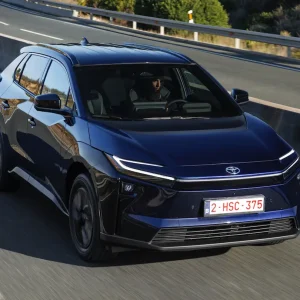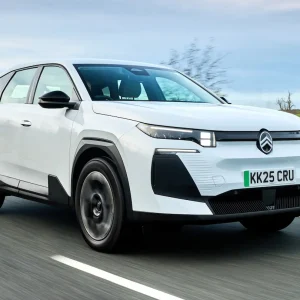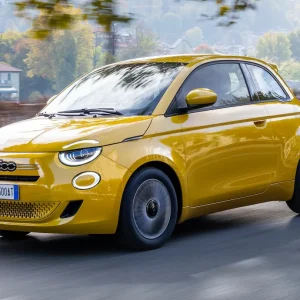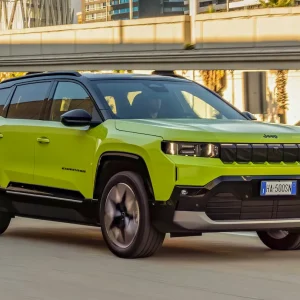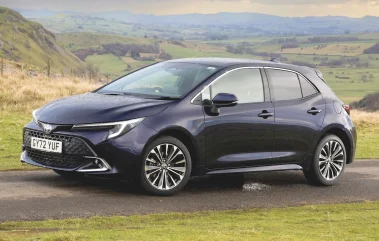
The car tested here is a more significant one than it might initially appear. It’s the newly facelifted Toyota Corolla, the mid-life update for the model that re-entered the UK in 2019 – and in exterior styling terms, a pretty minor update at that. However, it is also Toyota’s first UK model to feature its new, fifth-generation hybrid powertrain technology – and, since Toyota has been a leader in hybrids ever since the first Prius was launched in 1997, that’s a pretty big deal.
Although the Corolla’s basic powertrain options are the same as before – 1.8-litre and 2.0-litre petrol hybrids – they have been given upgrades including a more powerful battery (which is also smaller and lighter), improved throttle calibration, a new power control unit and new transaxle designs. The result of this is the total output of the 1.8-litre version is up from 122hp to 140hp, while the 2.0-litre is up from 184hp to 196hp. CO2 emissions are unchanged for the 1.8-litre, and slightly improved for the 2.0-litre.
Toyota says its aims with the powertrain tweaks were mainly performance-focused, and on the road in the 1.8, there is plenty of evidence of this, particularly around town, with the powertrain picking up well at low speeds and the car feeling well at home nipping into gaps in traffic, with light steering adding to the sense of manoeuvrability here. Performance is adequate at higher speeds too, and refinement is very good most of the time, although it can get a bit noisy when accelerating onto motorways.
As for the 2.0-litre, this has noticeably more low-down grunt, but you really feel the benefit with higher speed acceleration, which approaches warm-hatch territory. That said, it’s not a performance game- changer most of the time, and no better acoustically. Interestingly though, with the mid-range Design grade tested here, the 2.0-litre actually has a slightly better official fuel economy figure than the 1.8, and also a marginally better CO2 figure, although not by enough to drop it into a lower company car tax BIK band. The 1.8 is still nearly £2k cheaper to buy, and around 2p per mile cheaper to run.
The Corolla is a decent handler, with a good sense of responsiveness in bends and stability nicely maintained. As for comfort, it does a reasonably good job gliding over manhole covers and surface imperfections, although fairly firm seats fitted with the Design grade undermine the suspension’s efforts.
As noted previously, exterior design changes with the facelift are minimal, including tweaks to the front grille and headlights and new alloy wheel designs. More noteworthy updates are inside, where we now find a 10.5in infotainment touchscreen (up from 8in previously) and a 12.3in driver display standard throughout the range. Infotainment used to be a bit of a weakness for Toyota, but this is no longer the case. The new bigger central screen is easy to read and operate, while separate audio and ventilation controls mean no bothersome delving into menus for simple functions, and the new driver display also works well.
Material quality with the Design spec we tested is decent given its lower-middle position in the range, with (synthetic) leather liberally deployed.
Rear legroom is okay and headroom good, but back-seat passengers might be disappointed by the lack of a rear USB port, which is only available with the range-topping Excel grade. There’s only one port in the front as well, although there is wireless Apple Carplay connectivity and a wireless smartphone charger.
Access to the boot is over quite a high loading lip, but it is worth noting that the 361 litres of space on offer with 1.8-litre Corollas is significantly more than the 313 litres you get with the 2.0. If you need more room, a Touring Sports estate version is also available.
The Corolla’s only direct conventional hybrid lower-medium rival is the Honda Civic, and that only comes with a 2.0-litre, 184hp powertrain that is really more closely matched with the 2.0-litre Corolla than the 1.8 we’ve concentrated on here. However, an equivalent Civic is actually £5 cheaper than our test car on P11D, and on a cost-per-mile comparison the Toyota only comes out 0.28p ahead, although the Honda does use more fuel and sits two BIK bands higher due to higher CO2 emissions. Plug-in hybrid alternatives such as the Peugeot 308 cost a chunk more to buy and run, although an 8% BIK rate for that model will have strong company car driver appeal. Overall though – and particularly for drivers who can’t plug in – the Corolla represents a good all-round package.
Toyota Corolla Hatchback Design 1.8 Hybrid
P11D: £31,565
Residual value: 42.4%
Depreciation: £18,176
Fuel: £6,741
Service, maintenance and repair: £1,623
Cost per mile: 44.23p
Fuel consumption: 61.4mpg
CO2 (BIK %): 104g/km (25%)
BIK 20/40% a month: £132/£263
Luggage capacity: 361 litres
Engine size/power: 1,798cc/140hp

